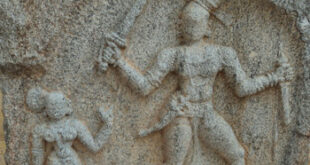- Vice President pays tribute to Sardar Bhagat Singh, Sukhdev and Rajguru on Shaheed Diwas.
- ‘Shaheed Diwas’ is commemorated every year on March 23 to remember the sacrifice made by the revolutionary leaders Bhagat Singh, Shivaram Hari Rajguru and Sukhdev Thapar who were hanged at the Lahore Central Jail in 1931.
- The trio was found guilty of the murder of deputy police superintendent JP Saunders in 1928, to avenge the death of Lala Lajpat Rai.
Contributions of Singh, Sukhdev and Rajguru:
- Among the three, Bhagat Singh is remembered as a charismatic freedom fighter.
- Singh, Sukhdev and Rajguru plotted to kill superintendent of police James Scott in Lahore in a bid to avenge the death of Lala Lajpat Rai.
- However, they mistakenly shot John Saunders, following which Singh fled to Calcutta to avoid arrest.
- He was arrested when he along with Batukeshwar Dutt hurled bombs in Delhi’s Central Assembly Hall, and raised the slogan of “Inquilab Zindabad!”
- On March 23, 1931, the three heroes of the independence movement, Singh, Rajguru and Sukhdev were hanged to death.
The Lily Thomas SC verdict
- A Surat court sentenced Congress leader Rahul Gandhi to two years in jail in a 2019 defamation case over his remarks about the “Modi surname”.
- As per the Representation of the People Act of 1951, conviction of a lawmaker for an offence with a two-year sentence or more leads to disqualification from the House.
- The disqualification takes effect only after three months have elapsed from the date of conviction.
- Within that period, the convicted lawmaker could have filed an appeal against the sentence before a higher court.
- However, this provision was struck down as “unconstitutional” in the Supreme Court’s landmark 2013 ruling in ‘Lily Thomas v Union of India’.
The case:
- In 2005, a PIL was filed before the Apex Court by a Kerala-based lawyer Lily Thomas and NGO Lok Prahari challenging Section 8(4) of the RPA as “ultra vires” to the Constitution.
- It protects convicted legislators from disqualification on account of their appeals pending before the higher courts.
- This plea sought to clean Indian politics of criminal elements by barring convicted politicians from contesting elections or holding an official seat.
- It drew attention to Articles 102(1) and 191(1) of the Constitution.
- Article 102(1) lays down the disqualifications for membership to either House of Parliament
- Article 191(1) lays down the disqualifications for membership to the Legislative Assembly or Legislative Council of the state.
- Before this judgment, convicted MPs could easily file an appeal against their conviction and continue holding their official seats.
- In 2013, a Supreme Court Bench held that Parliament had no power to enact sub-section (4) of Section 8 of the Act and it is ultra vires the Constitution.
- The Court also held that if any sitting member of Parliament or State Legislature is convicted of any offence under Section 8, RPA, then by virtue of such conviction and/or sentence they will be disqualified.
- The court added that a convicted parliamentarian or legislator’s membership will no longer be protected by Section 8 (4)
SOURCE: THE HINDU, THE ECONOMIC TIMES, PIB
 Chinmaya IAS Academy – Current Affairs Chinmaya IAS Academy – Current Affairs
Chinmaya IAS Academy – Current Affairs Chinmaya IAS Academy – Current Affairs



